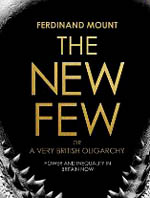Carla Carlisle reviews The New Few
A book about the British banking crisis looks at the events of the past four years with the aim of a sharpshooter, says Carla


Exquisite houses, the beauty of Nature, and how to get the most from your life, straight to your inbox.
You are now subscribed
Your newsletter sign-up was successful
To order any of the books reviewed or any other book in print, at
discount prices* and with free p&p to UK addresses, telephone the Country Life Bookshop on Bookshop 0843 060 0023. Or send a cheque/postal order to the Country Life Bookshop, PO Box 60, Helston TR13 0TP * See individual reviews for CL Bookshop price.
Britain today The New Few: Or a Very British Oligarchy Ferdinand Mount (Simon & Schuster, £18.99, *£16.99)
DON'T BE confused by the shark's mouth on the cover. The mouth that set Mr Mount going belongs to William F. Aldinger III. On May 30, 2003, the shareholders of the Hong Kong and Shanghai Banking Corporation (HSBC) assembled in the Barbican Hall for their annual general meeting. One of the world's largest high-street banks, HSBC was about to grow even bigger by obtaining the firm of Household International, together with its chief executive officer, Mr Aldinger.
Few shareholders were aware that Household was mainly known for supplying sub-prime mortgages to nearly 50 million Americans, who would not otherwise be able to obtain one, or that, guided by its CEO Sir John Bond, HSBC had agreed to pay $13 billion (£9 billion) for the company and, for Mr Aldinger, a three-year pay deal of £35 million plus fringe benefits, including a dental plan for him and his wife, Alberta, until the day they died.
For shareholders who thought this was a bridgework too far, there was an unexpected distraction. An office worker named Abdul rose to speak. The contractors who employed him to clean Sir John's office gave him a mop, a bucket and £5 an hour. No dental plan. No pension. Sir John explained to him that the contractors paid the going rate. Just as Mr Aldinger would be paid the going rate.
The story of the meeting-and the $13 billion loss HSBC paid for Household and the $53 billion paid in three years for bad loans before the whole investment was written off-is worthy of Tom Wolfe, but Mr Mount looks at the British banking debacle through the narrowed eye of a sharpshooter, recording the losses (historical), the remuner-ation for failure in the boardroom (colossal) and the reward for shareholders (negligible).
Exquisite houses, the beauty of Nature, and how to get the most from your life, straight to your inbox.
The facts make your teeth hurt. Between 2000 and 2008, the FTSE All-Share index fell by 30%. During this same period, cash payment to executives rose by 80%. And the writer warns us that, despite the worst crash since 1929 and the longest period of stagnation since the 19th century, the manageriat is still selling decency and integrity down the river in the name of greed.
Mr Mount's aim, however, is not to tell us how corrosive capitalism has become, but to show how the corrosion rots democracy as inevitably as gum disease loosens teeth. He paints a troubling picture of how flimsy our sacred institutions now are. He hasn't abandoned hope. If you're trying to make sense of the mess we're in, read this book. It's a pity for Mr Mount that the title Bonfire of the Vanities was already taken.
* Subscribe to Country Life and Pay just £29.99
Country Life is unlike any other magazine: the only glossy weekly on the newsstand and the only magazine that has been guest-edited by His Majesty The King not once, but twice. It is a celebration of modern rural life and all its diverse joys and pleasures — that was first published in Queen Victoria's Diamond Jubilee year. Our eclectic mixture of witty and informative content — from the most up-to-date property news and commentary and a coveted glimpse inside some of the UK's best houses and gardens, to gardening, the arts and interior design, written by experts in their field — still cannot be found in print or online, anywhere else.
